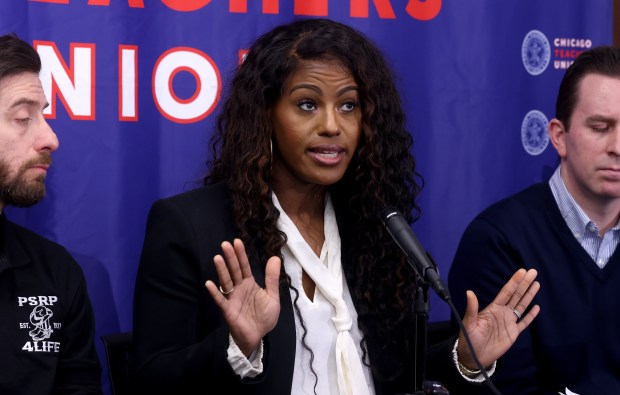The day after a tentative Chicago Teachers Union contract was reached, Mayor Brandon Johnson took a victory lap on the pivotal education win — one long-promised and hard-won.
“I said, ‘get it done,’ and they did,” an ebullient Johnson told reporters at City Hall on Tuesday, almost a year after the previous agreement expired. “I’m confident that the people of Chicago are relieved, first of all, that we’re not going to have the teachers strike or even a strike vote. It’s the first time in 15 years.”
Johnson indeed reached this point without Chicago Public Schools classrooms closing, unlike his predecessors Lori Lightfoot and Rahm Emanuel. But it remains to be seen whether the journey to get here was worth it for the mayor and his staunchest labor ally.
Johnson’s critics are already pledging to pounce on his close alliance with the teachers union in the 2027 mayoral campaign. They will find ample fodder in the rancorous process that led to this point, along with certain-to-continue tensions among a divided school board, mayor’s office and lame-duck CEO Pedro Martinez.
One City Council opponent, downtown Ald. Brian Hopkins, had a succinct answer when asked what the negotiations cost Johnson and the CTU: “Their reputations.”
Asked to justify the chaos that got him here, Johnson rattled off contract highlights such as smaller class sizes and higher veteran teacher pay.
“I mean, I could keep going. I’m saying all of it is worth it when we are investing in our public accommodations,” the mayor said. “I believe that if the members of this union decide to codify the agreement, it’s going to be an incredible win for the people of Chicago.”
Lingering liabilities for the mayor
In the end, CTU supporters and opponents alike did not find much fault with the pending contract, which provides 4% raises in the first year and 4% to 5% per year for the remainder. The fact that the final economic terms were more or less on the table for months while the various factions continued to publicly attack one another and the threat of a strike loomed raises questions about Johnson’s ability to close the deal.
Union President Stacy Davis Gates characterized the hiccups along the way as a healthy sign of a mayor fighting for “the public good” throughout a “group project” process.
“Chicago is in a different type of space right now with the mayor, who was a middle school teacher that sends his children to the Chicago Public Schools.” Davis Gates said at a Tuesday news conference. “That’s why it feels different.”
Johnson detractors, however, found plenty of fault with that “group project,” which became an embarrassing spectacle at times. The instability has led some to note how the final days of mayoral control over CPS — before a transition to an elected school board the CTU has long championed — coincided with the union’s chosen mayor struggling to show he’s in charge as contract negotiations dragged on.
“Be careful what you wish for,” Hopkins remarked on that turn of events.
The law creating the elected school board preserved Johnson’s ability to appoint all seven members until this past January, when it transitioned to a 21-member hybrid model, with 10 elected members from last November, and 11 appointed by the mayor. All seats will be filled by elected members after the 2026 board races.
As Johnson faced mounting pressure to enact his CPS budget plans, his team stumbled repeatedly before and after he lost full command of the school board in January. The missteps left him vulnerable to the critique that he doesn’t have a clear idea of how to lead the nation’s fourth-largest school district and its 325,000 students.
In September, the mayor unsuccessfully tried to push out Martinez after the schools chief refused to include $175 million of the Municipal Employees’ Annuity and Benefit Fund in the 2025 CPS budget and shot down a loan to cover the costs of that pension for nonteaching CPS staff plus the start of the CTU contract. All seven of Johnson’s school board appointees then made the remarkable decision to resign en masse rather than fire the CEO.
The mayor’s second appointed school board terminated Martinez without cause in December. But the schools chief enforced his right to stay on until June and has obstructed the mayor’s maneuvers to punt the MEABF to CPS every step of the way.
The latest funding plan Johnson’s team has sought to sell board members on was for CPS to issue $242 million in debt. But his handpicked school board President Sean Harden delayed a vote last month on that budget amendment when it became clear they did not have enough support.
Johnson has struggled to explain his pivot from decrying mayoral rule of CPS as a CTU organizer, to now lambasting those who challenge his authority after he assumed power. The freshman mayor has both portrayed resistance to him as antagonism toward a progressive Black leader, and insisted that more “democracy” is a good thing.
Meanwhile, Johnson’s backers have ramped up the political pressure against those who oppose him.
Ald. Byron Sigcho-Lopez, one of the mayor’s top council surrogates, likened the CTU contract negotiations process to the 1980s “Council Wars,” when a group of white aldermen tried to thwart Mayor Harold Washington’s every move. It’s an analogy the Pilsen alderman and other Johnson supporters have increasingly invoked throughout the CPS saga, to the chagrin of council colleagues who maintain the mayor’s naysayers span political and racial blocs.
Sigcho-Lopez decried the “obstruction” and quickly zeroed in on Gov. JB Pritzker, saying the governor must now pass a tax on millionaires and use the revenue to fund CPS.
“It’s time that not only people claim that they are better than Trump, they have to show by their actions that they are better than Trump by investing in our public education system,” Sigcho-Lopez said.
Political divisions aside, former CPS CEO Arne Duncan said the district avoiding a strike is a “huge deal” after past work stoppages have worn out parents’ patience.
“This is a very, very complicated, scary time of uncertainty for kids and families, and what they most need from the schools is stability,” Duncan, an Emanuel appointee, said.
Ald. Walter Burnett, a mayoral ally, offered one critique (which the mayor himself shares): Johnson made a mistake in not firing Martinez earlier. But the City Council veteran argued the mayor “stuck to his guns” in the face of an onslaught of opportunistic attacks from critics nursing their own political ambitions.
“I think people see he’s not a punk mayor, he’s not afraid to do what he thinks is right,” Burnett, Johnson’s vice mayor, said.
Burnett predicted that Johnson will be buoyed by earned appreciation and renewed engagement from one of the city’s most powerful — and confrontational — unions as he dives into the rest of his progressive agenda.
“Now what’s going to happen when his friends are free,” Burnett said, “you’re getting ready to see all of the rest of us in the middle of these giants fighting,” referring to the CTU and their “well-monied” opponents.
All eyes on divided school board, CTU’s future
Martinez declined to offer the mayor praise when reporters asked Tuesday whether Johnson’s leadership was helpful in getting the pending contract — which still requires full union ratification and a Chicago Board of Education stamp — across the finish line. He instead referenced tense moments during bargaining with the CTU.
“There’s no reason to be combative, there’s no reason to be unprofessional, there’s no reason to be disrespectful,” Martinez said, without naming anyone.
Asked how the city could afford the contract, the mayor flatly said it is “the responsibility of the CEO to be able to come up with mechanisms.”
He then elicited laughs from his senior team when asked if Martinez answers to him: “Well, he should.”
Johnson’s joke struck at a core truth of Chicago politics. Voters by and large don’t care about the intricacies of who’s responsible for what within the city’s massive public bureaucracy. The buck stops on the fifth floor of City Hall, and the occupant of the mayor’s office gets credit for the successes — and wears the jacket for the failures.
Martinez and Johnson have been at loggerheads for months over who will absorb the $175 million MEABF. The CEO delivered another warning to the mayor over the pension dispute on Tuesday, saying there is enough money from the city’s surplus tax increment financing funds to cover the first year of CTU’s four-year deal — “as long as the money is used that way.”
Before the March vote on a budget amendment allowing Johnson’s $242 million borrowing plan was yanked, district leaders warned midyear layoffs or furloughs were on the table if CPS had to cover both the MEABF and first year of CTU raises. That danger remains in the next three years. Meanwhile, the district has to prepare its 2026 budget that has a projected $500 million deficit.
Johnson is not unique among mayors, in that he does not yet have a solution to pay for the four-year CTU contract. Under Lightfoot, the district benefited from a surfeit of federal stimulus dollars that went to hiring. Johnson does not have that luxury and even faces the threat of deep cuts to federal funding under President Donald Trump.
Worsening this mayor’s position is his team including the pension payment in his 2024 budget with the assumption CPS would reimburse the city. That has not come to pass, blowing open a hole of up to $175 million in the city ledger.
The two paths emerging ahead for Johnson are not enviable.
His top officials are floating a “reconciliation” of the difference, perhaps by dipping into reserves, without City Council approval.
That would avoid a likely contentious council vote, but would threaten his already-precarious control of the body after Johnson’s last budget was almost upended by poor relationships with his legislative counterparts.
The other option is to have another go at the school board voting on picking up the MEABF and his $242 million borrowing plan. The downside would be that supporting that measure would imperil his supporters on the board once all 21 seats are up for reelection in 2026, while another unsuccessful campaign for a budget amendment could worsen Johnson’s credibility.
A budget amendment needs 14 of 20 votes to pass because the board president only votes in a tie. But seven elected members of the hybrid board came out against Johnson’s CPS borrowing plan last month.
Jennifer Custer, one of the seven elected board members condemning more CPS borrowing, was a CTU-endorsed candidate, raising early questions about the popularity of the union’s agenda under Caucus of Rank-and-File Educators — or CORE — leadership.
CORE is spearheaded by Davis Gates, a close Johnson ally who faces reelection in May. Her fate will be intertwined with Johnson’s in 2027, as the labor juggernaut under her watch has proven to be his most loyal, best-funded political ally.
Amid the bargaining turmoil, a group of teachers dubbed the Respect Educate Advocate Lead (REAL) Caucus announced an opposition slate in February. Their pitch? That CORE’s leadership has grown too divisive and strays from the cause of advocating for teachers.
“We don’t have the backing of the community right now,” said Erika Meza, a South Side teacher challenging Davis Gates for union president this spring.
Alison Eichhorn, REAL’s vice president pick, added: “If we have destroyed (allies) in the name of getting the most transformative contract that’s ever existed, then I don’t know that it was worth it.”
Indeed, the CTU’s hard-nosed approach has strained relationships with the Service Employees International Union. That growing feud between two labor powerhouses who were Johnson’s biggest backers in 2023 could harm his path to reelection in 2027.
The mayor, however, was resolute when asked Tuesday whether any of these signs pointed to trouble ahead of next year’s school board races, when he hopes to see a better showing from candidates supporting his school agenda.
“No,” he answered.





